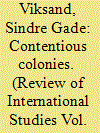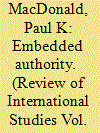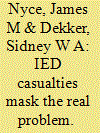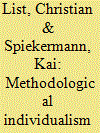|
|
|
Sort Order |
|
|
|
Items / Page
|
|
|
|
|
|
|
| Srl | Item |
| 1 |
ID:
176496


|
|
|
|
|
| Summary/Abstract |
While structural models of empire have recently re-emerged in the theoretical debates in the field of International Relations, a lack of attention has been paid to peripheral actors therein. This is particularly true for the analysis of the peripheries’ relations with polities outside the imperial structure of which the peripheries are a part. In this article, I build a framework to better understand how these extra-imperial ties are translated into peripheral positional power. This framework is constructed on the basis of three core arguments. First, to theorise peripheral power, peripheries need to be positioned in networks outside the imperial structure. Second, the positional power of peripheries depends on the quality of the ties they have to external actors. Peripheries with dense and exclusive ties to external actors are more powerful than those with only sparse and non-exclusive ties. Third, from the different combinations of density and exclusivity arise not only variations in positional power, but also the likely strategies that are engaged in forming alliances with external actors. These logics are illustrated through the study of two cases of the diplomacy of decolonisation: the American Revolutionary War and the Angolan War of Independence.
|
|
|
|
|
|
|
|
|
|
|
|
|
|
|
|
| 2 |
ID:
157729


|
|
|
|
|
| Summary/Abstract |
Relations of sovereign inequality permeate international politics, and a growing body of literature grapples with the question of how states establish and sustain hierarchy amidst anarchy. I argue that existing literature on hierarchy, for all its diverse insights, misses what makes hierarchy unique in world politics. Hierarchy is not simply the presence of inequality or stratification among actors, but rather an authority relationship in which a dominant actor exercises some modicum of control over a subordinate one. This authority relationship, moreover, is dramatically different than ones found in domestic hierarchies. It is shaped less by written laws or formal procedures, than by subtle forms of manipulation and the development of informal practices. For this reason, hierarchy cannot simply be reduced the to the dynamics of anarchy, and must be viewed as a relational phenomenon. Ties between actors create positions that permit dominant actors to appropriate and orchestrate the sharing of authority with subordinate intermediaries. This article develops this relational network approach, highlighting how concepts such as access, brokerage, and yoking can illuminate the processes by which authority is enlisted and appropriated in world politics.
|
|
|
|
|
|
|
|
|
|
|
|
|
|
|
|
| 3 |
ID:
096705


|
|
|
|
|
| Publication |
2010.
|
| Summary/Abstract |
Casualty figures suggest that the US/Allied Counter Improvised Explosive Device (C-IED) policy and the present allocation of national assets, resources, and intellectual capital have not been very successful. A number of explanations for why this has been the case are discussed and critiqued here.
|
|
|
|
|
|
|
|
|
|
|
|
|
|
|
|
| 4 |
ID:
127822


|
|
|
|
|
| Publication |
2013.
|
| Summary/Abstract |
Political science is divided between methodological individualists, who seek to explain political phenomena by reference to individuals and their interactions, and holists (or nonreductionists), who consider some higher-level social entities or properties such as states, institutions, or cultures ontologically or causally significant. We propose a reconciliation between these two perspectives, building on related work in philosophy. After laying out a taxonomy of different variants of each view, we observe that (i) although political phenomena result from underlying individual attitudes and behavior, individual-level descriptions do not always capture all explanatorily salient properties, and (ii) nonreductionistic explanations are mandated when social regularities are robust to changes in their individual-level realization. We characterize the dividing line between phenomena requiring nonreductionistic explanation and phenomena permitting individualistic explanation and give examples from the study of ethnic conflicts, social-network theory, and international-relations theory.
|
|
|
|
|
|
|
|
|
|
|
|
|
|
|
|
|
|
|
|
|